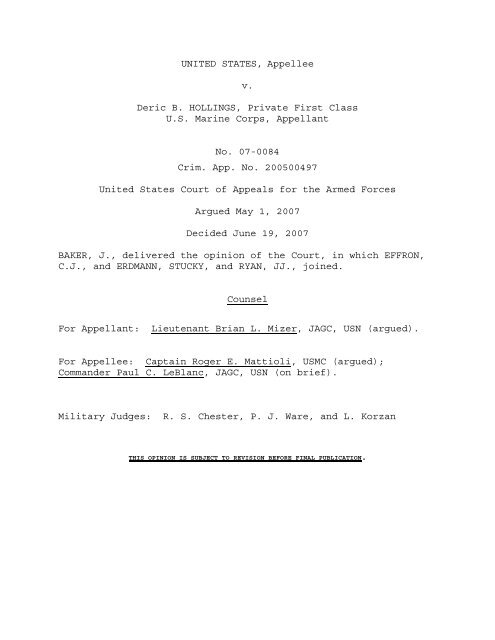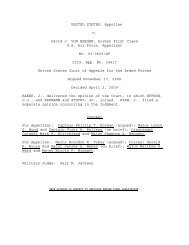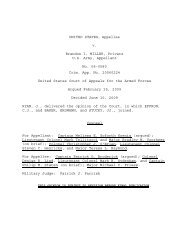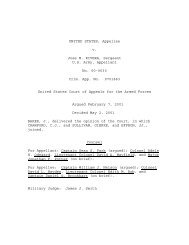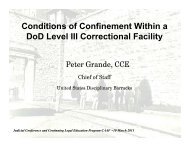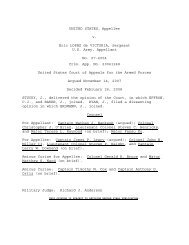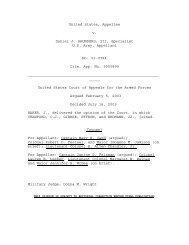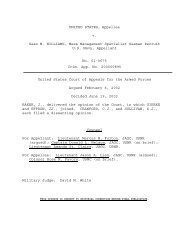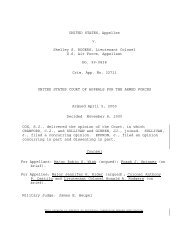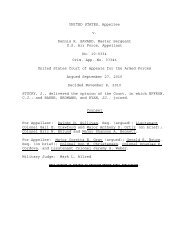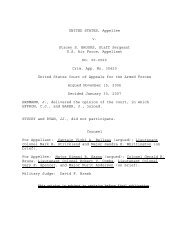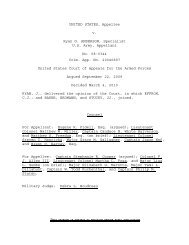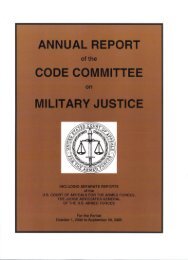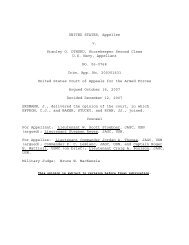UNITED STATES v. HOLLINGS - U.S. Court of Appeals for the ...
UNITED STATES v. HOLLINGS - U.S. Court of Appeals for the ...
UNITED STATES v. HOLLINGS - U.S. Court of Appeals for the ...
You also want an ePaper? Increase the reach of your titles
YUMPU automatically turns print PDFs into web optimized ePapers that Google loves.
<strong>UNITED</strong> <strong>STATES</strong>, Appelleev.Deric B. <strong>HOLLINGS</strong>, Private First ClassU.S. Marine Corps, AppellantNo. 07-0084Crim. App. No. 200500497United States <strong>Court</strong> <strong>of</strong> <strong>Appeals</strong> <strong>for</strong> <strong>the</strong> Armed ForcesArgued May 1, 2007Decided June 19, 2007BAKER, J., delivered <strong>the</strong> opinion <strong>of</strong> <strong>the</strong> <strong>Court</strong>, in which EFFRON,C.J., and ERDMANN, STUCKY, and RYAN, JJ., joined.CounselFor Appellant: Lieutenant Brian L. Mizer, JAGC, USN (argued).For Appellee: Captain Roger E. Mattioli, USMC (argued);Commander Paul C. LeBlanc, JAGC, USN (on brief).Military Judges: R. S. Chester, P. J. Ware, and L. KorzanTHIS OPINION IS SUBJECT TO REVISION BEFORE FINAL PUBLICATION.
United States v. Hollings, No. 07-0084/MCJudge BAKER delivered <strong>the</strong> opinion <strong>of</strong> <strong>the</strong> <strong>Court</strong>.At a special court-martial consisting <strong>of</strong> <strong>of</strong>ficer members,Appellant was convicted <strong>of</strong> disrespect toward a noncommissioned<strong>of</strong>ficer, failure to obey a lawful order, and violation <strong>of</strong> ageneral order, in violation <strong>of</strong> Articles 91 and 92, Uni<strong>for</strong>m Code<strong>of</strong> Military Justice (UCMJ), 10 U.S.C. §§ 891, 892 (2000). Theadjudged and approved sentence was a bad-conduct discharge andno o<strong>the</strong>r punishments. The <strong>Court</strong> <strong>of</strong> Criminal <strong>Appeals</strong> affirmed inan unpublished opinion. United States v. Hollings, No. NMCCA200500497 (N-M. Ct. Crim. App. Oct. 18, 2006). We grantedreview <strong>of</strong> <strong>the</strong> following issue:WHETHER THE MILITARY JUDGE FAILED TO ADHERE TO THELIBERAL GRANT MANDATE WHEN HE DENIED A DEFENSECHALLENGE FOR CAUSE AGAINST CHIEF WARRANT OFFICER WWHO SERVED AS ACTING LEGAL OFFICER TO THE CONVENINGAUTHORITY IN APPELLANT’S CASE.Chief Warrant Officer (CWO-5) Westfall was <strong>the</strong> installationpersonnel <strong>of</strong>ficer at Marine Corps Air Station, Miramar,Cali<strong>for</strong>nia. During voir dire, he stated that at <strong>the</strong> timeAppellant’s charges were preferred, he was “dual-hatted” as <strong>the</strong>personnel <strong>of</strong>ficer <strong>for</strong> both <strong>the</strong> station as well as Headquartersand Headquarters Squadron (H&HS). As a result, he was on <strong>the</strong>distribution list <strong>for</strong> <strong>the</strong> squadron weekly legal report. 1Hestated that in <strong>the</strong> two weeks prior to <strong>the</strong> court-martial he1 This report appears to have been a weekly listing <strong>of</strong>individuals denoting where <strong>the</strong>ir cases were at <strong>the</strong> variousstages <strong>of</strong> legal processing.2
United States v. Hollings, No. 07-0084/MCrecalled Appellant’s name on <strong>the</strong> report listing <strong>the</strong> particulararticles <strong>of</strong> <strong>the</strong> UCMJ he was alleged to have violated and <strong>the</strong>fact that Appellant was pending court-martial at <strong>the</strong> time. Hecharacterized his interaction with <strong>the</strong> H&HS legal <strong>of</strong>ficer asfollows:If she [<strong>the</strong> H&HS legal <strong>of</strong>ficer] needed something fromme in support [<strong>of</strong>] her legal actions, or if I had tocertify <strong>the</strong> unit diaries, recording <strong>the</strong> completedlegal action, I would do that. And if I neededin<strong>for</strong>mation from her to adjust <strong>the</strong> morning report orto keep track <strong>of</strong> some <strong>of</strong> <strong>the</strong>se o<strong>the</strong>r administrativeactions, <strong>the</strong>n I would come back to see her.Regarding <strong>the</strong> certification <strong>of</strong> unit diaries, 2he indicated tha<strong>the</strong> per<strong>for</strong>med this task on days that <strong>the</strong> legal <strong>of</strong>ficer was notavailable. He also stated that although certification <strong>of</strong> unitdiaries was a job that a legal <strong>of</strong>ficer could do and usually did,he stated that it was a job that a personnel <strong>of</strong>ficer wasrequired to do. The relevant voir dire exchange follows:DC: So when she [<strong>the</strong> legal <strong>of</strong>ficer] was unavailablein <strong>the</strong> February timeframe, you would act as <strong>the</strong> legal<strong>of</strong>ficer <strong>for</strong> H&HS?MBR: No, sir. I didn’t act as <strong>the</strong> legal <strong>of</strong>ficer, butI did certify <strong>the</strong> unit diary transactions whichrecorded NJPs or court-martials [sic].DC: Is that a job that a legal <strong>of</strong>ficer usually does?2 The unit diary is <strong>the</strong> administrative medium used to reportevents and occurrences <strong>of</strong> <strong>the</strong> unit, personnel actions and o<strong>the</strong>rdata relative to members <strong>of</strong> <strong>the</strong> unit. Marine Corps Total ForceSystem Personnel Reporting Instructions Manual (MCTFSPRIM),Marine Corps Order PL080.40C, para. 20100 (June 7, 2001).3
United States v. Hollings, No. 07-0084/MCMBR: It is a job that a legal <strong>of</strong>ficer can and usuallydoes. It also [is] a job that [<strong>the</strong>] personnel <strong>of</strong>ficeris required to do, certify unit diaries.DC: So you per<strong>for</strong>med some duties <strong>of</strong> a legal <strong>of</strong>ficerin February?MBR: I certified unit diaries. I didn’t necessarilyrequest legal services. I didn’t type Group NJPs,o<strong>the</strong>r UPBs [unit punishment books], I didn’t go in <strong>for</strong>court-martials [sic] or <strong>of</strong>fice hours, 3 I didn’t give<strong>the</strong> [commanding <strong>of</strong>ficer] any opinions or legalrecommendations.Defense counsel challenged CWO-5 Westfall <strong>for</strong> cause, claimingthat he qualified as a “legal <strong>of</strong>ficer” under Rule <strong>for</strong> <strong>Court</strong>s-Martial (R.C.M.) 912(f)(1)(G). Defense counsel did notchallenge CWO-5 Westfall on <strong>the</strong> grounds <strong>of</strong> actual or impliedbias, a point verified by <strong>the</strong> military judge as part <strong>of</strong> hisruling. Specifically, <strong>the</strong> military judge stated:I did not hear him say, Captain Smith, that he wasinvolved in this case specifically, that he actuallyreviewed or processed <strong>the</strong> charges that are pendingbe<strong>for</strong>e this court-martial. And I don’t believe that<strong>the</strong> limited involvement, if you will, in reviewing <strong>the</strong>standard weekly legal report rises to <strong>the</strong> level <strong>of</strong> achallenge <strong>for</strong> cause. If <strong>the</strong> sole basis <strong>for</strong> <strong>the</strong>challenge is that he is or was acting as a legal<strong>of</strong>ficer in this case, that basis doesn’t exist and <strong>the</strong>challenge <strong>for</strong> cause is denied.The United States Navy-Marine Corps <strong>Court</strong> <strong>of</strong> Criminal <strong>Appeals</strong>agreed, concluding that “[t]he sole basis alleged at trial <strong>for</strong><strong>the</strong> challenge was that CWO Westfall was <strong>the</strong> unit legal <strong>of</strong>ficerand was <strong>the</strong>re<strong>for</strong>e prohibited from sitting as a member per R.C.M.3 Hearings pursuant to Article 15, UCMJ, 10 U.S.C. § 815 (2000).4
United States v. Hollings, No. 07-0084/MC912(f)(1)(G). The Appellant does not allege, nor do we find,evidence <strong>of</strong> bias, ei<strong>the</strong>r actual or implied.” Hollings, No.NMCCA 200500497, slip op. at 3.On appeal to this <strong>Court</strong>, Appellant renews his argument thatCWO-5 Westfall acted as legal <strong>of</strong>ficer in this case. He fur<strong>the</strong>rargues that Westfall should have been removed <strong>for</strong> cause on <strong>the</strong>ground <strong>of</strong> implied bias and that in denying Appellant’s challenge<strong>for</strong> cause, <strong>the</strong> military judge failed to adhere to <strong>the</strong> liberalgrant mandate. We address each argument in turn.R.C.M. 912(f)(1)(G) provides that “A member shall beexcused <strong>for</strong> cause whenever it appears that <strong>the</strong> member: . . . Hasacted in <strong>the</strong> same case as convening authority or as <strong>the</strong> legal<strong>of</strong>ficer or staff judge advocate to <strong>the</strong> convening authority.”Article 1 <strong>of</strong> <strong>the</strong> UCMJ 4defines “legal <strong>of</strong>ficer” as “anycommissioned <strong>of</strong>ficer <strong>of</strong> <strong>the</strong> . . . Marine Corps . . . designatedto per<strong>for</strong>m legal duties <strong>for</strong> a command.” Put directly, CWO-5Westfall did not meet this definition and he did not act in thiscase as <strong>the</strong> legal <strong>of</strong>ficer. He did what personnel <strong>of</strong>ficers do,he certified <strong>the</strong> unit diary. On this record, any argument to<strong>the</strong> contrary is at best a reach.Appellant next argues in <strong>the</strong> alternative that CWO-5Westfall should have been excused on <strong>the</strong> ground <strong>of</strong> implied bias.4 10 U.S.C. § 801 (2000).5
United States v. Hollings, No. 07-0084/MCWhe<strong>the</strong>r Westfall technically served as a “legal <strong>of</strong>ficer” in thiscase or not, he was a “career legal <strong>of</strong>ficer,” he was familiarwith Appellant’s case as a result <strong>of</strong> his duties, and at leastsome <strong>of</strong> those duties were legal in nature. According toAppellant, as a result, CWO-5 Westfall’s participation wouldundermine <strong>the</strong> public’s perception in <strong>the</strong> impartiality andfairness <strong>of</strong> Appellant’s court martial.We are left to wonder whe<strong>the</strong>r we are reviewing a differentrecord <strong>of</strong> trial. According to CWO-5 Westfall’s voir diretestimony, he served as “Personnel Officer <strong>for</strong> <strong>the</strong> station.” Healso had occasion to cover <strong>the</strong> personnel <strong>of</strong>ficer’sresponsibilities <strong>for</strong> H&HS. This was Appellant’s squadron. Inthis capacity, CWO-5 Westfall “was on <strong>the</strong> distribution <strong>for</strong> <strong>the</strong>H&HS legal report, <strong>the</strong> weekly legal report, wherein <strong>the</strong>defendant’s name and <strong>the</strong> charges against him are represented onthat report. No o<strong>the</strong>r detailed in<strong>for</strong>mation is present on thatreport.” Westfall had served in <strong>the</strong> Marine Corps as a legal<strong>of</strong>ficer and went to <strong>the</strong> Naval Justice School <strong>for</strong> <strong>the</strong> legal<strong>of</strong>ficer’s course in 1990 or 1991. But he was not a “careerlegal <strong>of</strong>ficer.” He served as a legal <strong>of</strong>ficer <strong>for</strong> “two yearsplus” following <strong>the</strong> legal <strong>of</strong>ficer’s course. He <strong>the</strong>n “assisted<strong>the</strong> legal <strong>of</strong>ficer at <strong>the</strong> infantry battalion on my next tour,helped out a little at <strong>the</strong> regiment, and have pretty much beenrelieved from <strong>the</strong> legal <strong>of</strong>ficer responsibility since <strong>the</strong>n.”6
United States v. Hollings, No. 07-0084/MCCWO-5 Westfall was not a legal <strong>of</strong>ficer at <strong>the</strong> time <strong>of</strong>Appellant’s court-martial. His knowledge was derived from <strong>the</strong>H&HS weekly legal report, which he reviewed in his capacity asacting personnel <strong>of</strong>ficer <strong>for</strong> <strong>the</strong> squadron. There is noindication that CWO-5 Westfall knew Appellant, and <strong>the</strong> onlyin<strong>for</strong>mation in <strong>the</strong> weekly legal report about <strong>the</strong> case pertainedto his name and <strong>the</strong> charges against him, facts <strong>of</strong> recordimmediately evident to anyone attending Appellant’s courtmartial.When asked by trial counsel whe<strong>the</strong>r he would “have anyreluctance whatsoever to [disagree with <strong>the</strong> conveningauthority]” on <strong>the</strong> findings or sentence in this case, CWO-5Westfall responded, “No, sir. I would be able to do what Ithought was right.” He <strong>the</strong>n added a finishing touch <strong>of</strong> salt:“And besides, I can’t get promoted again, so it really doesn’tmatter.” Defense counsel did not challenge CWO-5 Westfall on<strong>the</strong> ground <strong>of</strong> implied bias. And, on this record, we concur with<strong>the</strong> lower court’s finding that <strong>the</strong>re was no evidence <strong>of</strong> bias,actual or implied.None<strong>the</strong>less, Appellant argues that <strong>the</strong> military judge erredbecause he did not indicate that he addressed implied bias orconsidered <strong>the</strong> liberal grant mandate in ruling on Appellant’schallenge. We have enjoined military judges to follow <strong>the</strong>liberal grant mandate in evaluating challenges <strong>for</strong> cause.United States v. Clay, 64 M.J. 274, 277 (C.A.A.F. 2007); United7
United States v. Hollings, No. 07-0084/MCStates v. Leonard, 63 M.J. 398, 402 (C.A.A.F. 2006); UnitedStates v. Moreno, 63 M.J. 129, 134 (C.A.A.F. 2006). A militaryjudge who addresses <strong>the</strong> concept on <strong>the</strong> record is entitled togreater deference than one who does not. Clay, 64 M.J. at 277.However, this does not suggest that <strong>the</strong> military judge isentitled to no deference. Moreover, at trial <strong>the</strong> military judgedid not address actual or implied bias because defense counselargued that <strong>the</strong> sole basis <strong>for</strong> challenging CWO-5 Westfall washis per se disqualification as a legal <strong>of</strong>ficer under R.C.M.912(f)(1)(G).With respect to Appellant’s implied bias argument, <strong>the</strong>liberal grant mandate recognizes <strong>the</strong> military judge’sresponsibility to prevent both <strong>the</strong> reality and <strong>the</strong> appearance <strong>of</strong>bias involving potential court members. Id. R.C.M.912(f)(1)(N) requires <strong>the</strong> removal <strong>of</strong> a member “in <strong>the</strong> interest<strong>of</strong> having <strong>the</strong> court-martial free from substantial doubt as tolegality, fairness and impartiality.” For <strong>the</strong> reasons statedabove, no such doubts were raised by CWO-5 Westfall’s responsesduring voir dire, and <strong>the</strong> military judge acted within hisdiscretion in denying <strong>the</strong> challenge <strong>for</strong> cause.The decision <strong>of</strong> <strong>the</strong> United States Navy-Marine Corps <strong>Court</strong><strong>of</strong> Criminal <strong>Appeals</strong> is affirmed.8


